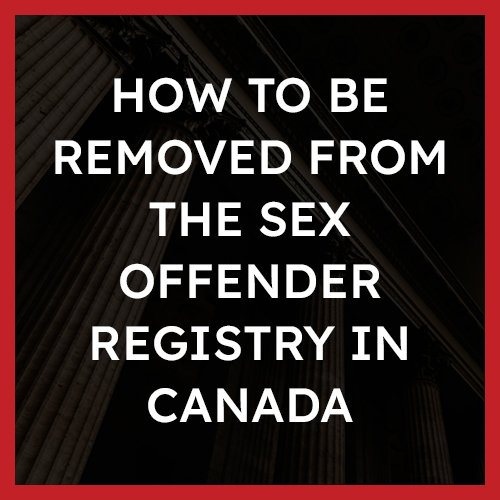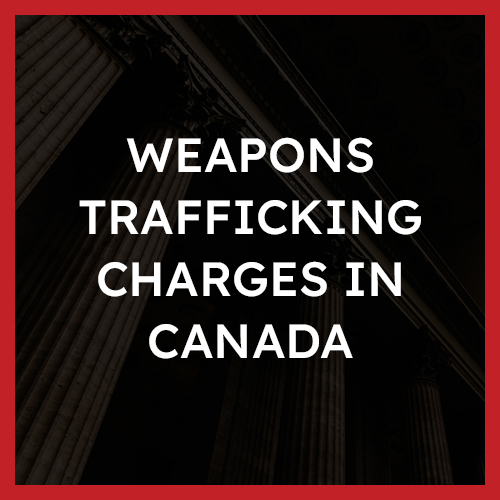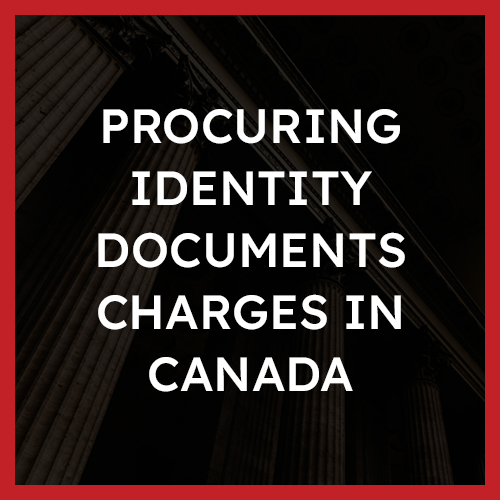How to be Removed from the Sex Offender Registry in Canada
Disclaimer: this article applies to the sex offender registry in Canada only. Other countries have their own similar registries, with very different parameters, rules, and processes. It is unlikely that anything in this article would apply beyond Canada.
The Government of Canada has demonstrated a clear intent to track as many people as possible for as long as possible through SOIRA. However, the lengthy and onerous obligations imposed through the sex offender registry can be reduced, and even removed, in the right circumstances.
In this article, we examine what a SOIRA order actually is, and the various governing provisions around it. You can also skip ahead to the more important part of the article regarding how to be removed from this registry immediately.
What is a SOIRA and SOIRA Order
 SOIRA is an acronym standing for Sexual Offender Information Registry Act. SOIRA is a federal statute concerned with the registration of individuals who have been convicted of sexual offences. The Act also sets out the process for maintaining the national sex offender database and provides information about the offender obligations that come along with a SOIRA order. Through SOIRA, the Canadian government established the National Sex Offenders Registry which serves to monitor and track those individuals convicted of designated offences.
SOIRA is an acronym standing for Sexual Offender Information Registry Act. SOIRA is a federal statute concerned with the registration of individuals who have been convicted of sexual offences. The Act also sets out the process for maintaining the national sex offender database and provides information about the offender obligations that come along with a SOIRA order. Through SOIRA, the Canadian government established the National Sex Offenders Registry which serves to monitor and track those individuals convicted of designated offences.
In 2004, the government of Canada enacted SOIRA because it was concerned about the sexual abuse and abduction of children.
When SOIRA was initially passed, it contained two important safeguards for offenders:
- A sex offender would only be placed on the registry if the Crown prosecutor first chose to apply to the court for an order requiring the offender to comply with SOIRA.
- SOIRA gave sentencing judges the discretion to exclude offenders from the registry if the effects of the SOIRA order on the individual’s privacy or liberty interests were grossly disproportionate to the public interest in protecting society.
However, these two safeguards were removed in 2011 following the enactment of the Protecting Victims from Sex Offenders Act, S.C. 2010, c. 17. In an instant, prosecutorial discretion and judicial discretion to impose SOIRA orders were removed from the provisions of the Criminal Code.
Post 2011, section 490.012 of the Criminal Code requires the mandatory registration of all offenders who have been found guilty of any one of the 27 different sexual offences designated in s. 490.011(1)(a) of the Criminal Code. This meant that every single person who meets this criteria is compelled to register their personal information on Canada’s national sex offender registry, regardless of their individual risk of reoffending.
Perhaps the most severe 2011 amendment was the automatic mandatory lifetime registration for offenders who commit more than one offence as per s.490.013(2.1) of SOIRA.
What is the purpose of SOIRA?
As stated in s. 2(1) of the Act, SOIRA’s intended purpose is:
“To help police services prevent and investigate crimes of a sexual nature by requiring the registration of certain information relating to sex offenders.”
Effectively, these individuals are placed on a national database with other individuals who have been convicted of the same select offences.
Who can access the SOIRA national database?
SOIRA is maintained by the Royal Canadian Mounted Police. If you’re subject to a SOIRA order in Canada, only the RCMP and police services can access the national database. Section 8 of SOIRA imposes obligations on police services administering the registry to keep any information that they collect confidential, and inaccessible to the general public.
This restricted access is quite different than many other jurisdictions where the sex offender registry is visible to the public, making it very difficult for sex offenders to reintegrate into society.
Relevant Criminal Code provisions
Whereas SOIRA is concerned with the registration and administration of the national database, the Criminal Code of Canada contains numerous provisions detailing when and how SOIRA orders should be imposed.
Specifically:
- 490.011 of the Criminal Codesets out which offences can lead to a SOIRA order
- 490.012 of the Criminal Code provides that SOIRA orders are mandatory for offenders convicted of designated offences (such as sexual assault and other sexual offences); and
- 490.013 of the Criminal Code sets out the applicable registration period.
Most notable is the lifetime registration mandated by s. 490.013 required for individuals convicted of more than one designated offence.
As discussed in further detail below, portions of s. 490.012 and 430.013 have recently been held to be unconstitutional by the Supreme Court of Canada, paving the way for removal from the sex offender registry in certain cases.
What are SOIRA designated offences?
The list of designated offences spans a broad range of criminal activities. Under s.490.011(1)(a) of the Criminal Code there are 27 designated offences that mandate a SOIRA order.
Under s.490.011(1)(a) a designated offence means an offence under any of the following provisions:
- subsection 7(4.1) (offence in relation to sexual offences against children),
- section 151 (sexual interference);
- section 152 (invitation to sexual touching);
- section 153 (sexual exploitation);
- section 153.1 (sexual exploitation of person with disability);
- section 155 (incest);
- Section 160(1) (bestiality);
- subsection 160(2) (compelling the commission of bestiality);
- subsection 160(3) (bestiality in presence of or by a child);
- section 163.1 (child pornography);
- section 170 (parent or guardian procuring sexual activity);
- section 171.1 (making sexually explicit material available to child);
- section 172.1 (luring a child);
- section 172.2 (agreement or arrangement — sexual offence against child);
- Section 173(2) (exposure);
- section 271 (sexual assault);
- section 272 (sexual assault with a weapon, threats to a third party or causing bodily harm);
- paragraph 273(2)(a) (aggravated sexual assault — use of a restricted firearm or prohibited firearm or any firearm in connection with criminal organization);
- paragraph 273(2)(a.1) (aggravated sexual assault — use of a firearm);
- paragraph 273(2)(b) (aggravated sexual assault);
- subsection 273.3(2) (removal of a child from Canada);
- section 279.011 (trafficking — person under 18 years);
- Section 279.02(2) (material benefit — trafficking of person under 18 years);
- Section 279.03(2) (withholding or destroying documents — trafficking of person under 18 years);
- Section 286.1(2) (obtaining sexual services for consideration from person under 18 years);
- Section 286.2(2) (material benefit from sexual services provided by person under 18 years); and
- Section 286.3(2) (procuring — person under 18 years).
The additional designated offences are listed in Section 490.011(1)(b) and are as follows:
- Section 162 (voyeurism)
- Section 173(1) (indecent acts)
- Section 177 (trespassing at night)
- Section 230 (murder in commission of offences)
- Section 231 (murder)
- Section 234 (manslaughter)
- Section 246(b) (overcoming resistance to commission of offence)
- Section 264 (criminal harassment)
- Section 279 (kidnapping)
- Section 279.01 (trafficking in persons)
- Section 279.011 (trafficking of a person under the age of 18 years)
- Section 280 (abduction of a person under the age of 16 years)
- Section 281 (abduction of a person under the age of 14 years)
- Section 348(1)(d) (breaking and entering a dwelling house with intent to commit an indictable offence)
- Section 248(1)(d) (breaking and entering a dwelling house and committing an indictable offence)
- Section348(1)(e) (breaking and entering a place other than a dwelling house with intent to commit an indictable offence)
Duration of SOIRA orders
Under s. 490.013(2) of the Criminal Code a SOIRA order ends:
- 10 years after it was made if the offence in connection with which it was made was prosecuted summarily or if the maximum term of imprisonment for the offence is two or five years;
- 20 years after it was made if the maximum term of imprisonment for the offence is 10 or 14 years; and
- NEVER if the maximum term of imprisonment for the offence is life.
Additionally, under s.490.013(2.1) a SOIRA order applies for life if the offender is found guilty of more than one designated offence.
What restrictions and obligations are imposed by a SOIRA order?
In Canada, for those individuals who are registered, SOIRA imposes many obligations on offenders.
Some of these obligations include the following:
- reporting within seven days of the SOIRA order being made, as per s.4(1) of SOIRA
- report in person to a registration centre, which are designated police station that administer the registry, when reporting for the first time as per s.4(3) of SOIRA
- you are not permitted to leave Canada until you have reported for the first time, as per s.4(4) of SOIRA
- you are required to report within 7 days of you changing either your primary or secondary residence or if you change your first/last name as per s.4.1(1) of SOIRA.
- You must also notify the registration centre if you intend to be away from your primary or secondary residence for seven or more consecutive days as per s. 6(1) of SOIRA.
- If you are leaving Canada, you must notify the registration centre, before departure, of your departure and return dates and of every address or location at which they expect to stay, whether the addresses or locations are in or outside Canada as per s. 6(1)(a) of SOIRA.
Upon reporting to a registration centre you must, as per s.5(1) of SOIRA, provide extensive personal information including your:
- Name, date of birth, and gender;
- the address of your principal and secondary residences;
- the address of every place of employment or volunteer location;
- the name of your employer or volunteer supervisor and a description of the work done;
- the address of every educational institution at which you are enrolled;
- your height and weight;
- a description of every physical distinguishing mark that you may have;
- your licence plate number, make, model, body type, year of manufacture and colour of every vehicle registered in your name or that you use regularly
- the contact phone number for each location where you can be reached at; and
- every mobile phone and pager in your possession (s. 5(1)(f)).
Additionally, as per s.4(3) and s.4.1(1) of SOIRA you must update your information in person yearly. It is important to note that police officers will conduct random compliance checks to verify the information on the registry. At a minimum, you are subject to at least one annual verification of your residential address.
Breach of SOIRA order
Breaches of SOIRA orders are treated very seriously.
Under s.490.03(1) of the Criminal Code it is an offence for you to fail to comply with SOIRA’s reporting obligations without “reasonable excuse”.
Further, s. 490.031(1) of the Criminal Code indicates that non-compliance with any of the reporting conditions may result in:
- penalties of up to 2 years imprisonment;
- up to $10,000 in fines; and/or both.
Even technical breaches, like failing to update your vehicle information, can result in significant penalties. In cases of lifetime SOIRA orders, the ever-present threat of criminal liability for failure to report remains constant, without regard for a person’s age, medical condition, or efforts at rehabilitation. Imagine someone being 95 years old, possibly immobile or suffering from dementia, yet still having to comply with SOIRA reporting requirements for something that occurred when the person was 18 years old.
Can I end my SOIRA order early?
Yes, you can end your SOIRA order early.
In fact, there are several paths to ending a SOIRA order early:
- Ending a SOIRA order early through a Termination Order
- Ending a SOIRA order early through a s. 24(1) Charter Motion
- Ending a SOIRA order early through a Record Suspension
The best and most applicable route to ending a SOIRA order is highly dependent on the length of the order imposed and the offence(s) for which it was imposed. It’s critical to select the approach that best fits your particular case.
Ending a SOIRA order early through a Termination Order
Although you must comply with SOIRA for the applicable registration period (per s. 490.013 of the Criminal Code) you can seek a “termination order” under s.490.016(1) of the Criminal Code once you become eligible.
If you are granted a Termination Order by the courts, you become free from any SOIRA obligations before the end of the applicable registration period.
A termination order is only granted if a judge is satisfied that you meet the criteria outlined in s. 490.016(1) of the Criminal Code, which states as follows:
The court shall make a termination order if it is satisfied that the person has established that the impact on them of continuing an order or an obligation, including on their privacy or liberty, would be grossly disproportionate to the public interest in protecting society through the effective prevention or investigation of crimes of a sexual nature, to be achieved by the registration of information relating to sex offenders under the Sex Offender Information Registration Act.
Basically, the judge has to rule that continuing your registration is grossly disproportionate to the public interest based on your unique circumstances. This means that the burden is on you to prove, on a balance of probabilities, that continuing the SOIRA order has a grossly disproportionate impact on you.
The case of R v Turnbull, 2006 NLCA 66 indicated that gross disproportionality requires that there be either “no impact, or a very low impact, on the public interest” of you not being registered.
The test includes, but is not limited to, the following factors to be considered:
- your record;
- the nature of the offence;
- the circumstances surrounding the offence;
- the number of years that have passed since you committed the offence; and
- your record since the offence;
It is also important to note that you can only bring an application for a termination order after a specific number of years have elapsed as indicated under s. 490.015(1) of the Criminal Code.
In the case of lifetime registration following a conviction for more than one offence under s. 490.013(2.1) of the Criminal Code, a termination order can be sought 20 years after the order to comply with SOIRA was made as per s. 490.015(1)(c) of the Criminal Code. However, the recent case Supreme Court case of R. v. Ndhlovu, 2022 SCC 38 (“Ndhlovu”), allows you to change the registration length if the SOIRA order was imposed unconstitutionally.
Ending a SOIRA order early through a s. 24(1) Charter Motion
This method of changing the length of a SOIRA order applies in very particular circumstances.
Specifically, it requires that:
- A lifetime SOIRA order has been imposed; and
- It was imposed pursuant to legislation that has been deemed unconstitutional
This path for termination only became available as of October 2022 with the release of the Supreme Court of Canada decision in Ndhlovu. It captures most, if not all, lifetime SOIRA orders imposed for the previous 10+ years.
Ending a SOIRA order early through a Record Suspension
Whereas Termination Orders and Charter Motions require formal court motions, a third path to removal from a sex offender registry is through a record suspension (formally known as a Pardon). You may apply for a termination order once a record suspension is granted.
Applications for record suspensions are governed by the Criminal Records Act. Under s.4(2) of the Criminal Records Act, if you have been convicted of an offence referred to in Schedule 1 (ie, a sexual offence against a child), you may apply and be granted a record suspension if the Parole Board of Canada is satisfied that:
- you were not in a position of trust or authority towards the victim of the offence; and
- the victim was not in a relationship of dependency on you; and
- you did not use, threaten to use or attempt to use violence, intimidation or coercion in relation to the victim; and
- you were less than five years older than the victim.
Ending a SOIRA order through a record suspension is probably the least onerous method of accomplishing this goal of all the options discussed. However, it is by no means simple. While there are many agencies out there offering to assist with record suspensions for general criminal offences, few understand the complex interplay between a criminal record and SOIRA orders.
The people reviewing a record suspension application for anyone will no doubt scrutinize any such application very closely. It’s therefore critical to ensure that you select the right lawyer to assist you with this service.
How can Strategic Criminal Defence help you with SOIRA orders?
If your SOIRA order is restricting your freedom, your ability to reintegrate into society, and your overall quality of life, we can help. Once we determine what approach is best in your case, we will help you put forward a persuasive application to reduce the length of your SOIRA order, or have you removed from the national sex offender registry completely.
Especially if you are currently bound by a lifetime SOIRA order, contact us immediately to determine whether it was imposed unconstitutionally. You may automatically be eligible to strike any such order.
The lawyers at Strategic Criminal Defence will zealously advocate on your behalf by putting forward a persuasive application before the court as to why you should be removed from the sex offender’s registry.
About The Author
Ask A Question
We endeavor to respond to questions within 24 hours. If your matter is urgent, please call our office or submit a request for a free consultation.







